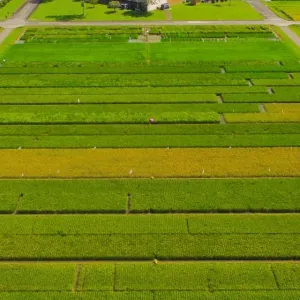Raising productivity and profits, How AgWise is Closing Yield Gaps through AI
Nairobi, 20 June 2025 (IITA) – Across Africa smallholder farmers battle working with degraded soils, inefficiency farming methods and climate change impacts which are constraining their productivity and profitability. What if a digital tool could help them make science-backed decisions on fostering soil health, knowing what seeds to plant, the type of fertilizer to apply and even what crop varieties

Raising productivity and profits, How AgWise is Closing Yield Gaps through AI
Nairobi, 20 June 2025 (IITA) – Across Africa smallholder farmers battle working with degraded soils, inefficiency farming methods and climate change impacts which are constraining their productivity and profitability.
What if a digital tool could help them make science-backed decisions on fostering soil health, knowing what seeds to plant, the type of fertilizer to apply and even what crop varieties to grow and at which time?
Enter AgWise – a free AI-driven platform that delivers site-specific, climate-smart advice on varieties, fertilisers, planting times and other good agronomic practices.
By integrating spatial data, crop models, and AI and machine learning, AgWise helps farmers optimize inputs, boost yields, and nurture soil health thereby turning guesswork into precision farming, according to Dr. Wuletawu Abera, a Senior Scientist at Multifunctional landscapes lever of Alliance of Bioversity International and CIAT.
Smallholder farmers often face low productivity due to climate variability, soil degradation, and suboptimal crop and input management, Dr. Abera said.
About 80 percent of cultivable land in Africa is degraded and up to 60 kg of nutrients per hectare are lost annually. Research predicts that by 2050 over half of the current arable land in Africa may be unusable because of degradation, biodiversity loss and climate change which has worsened soil erosion.
Soil degradation affects one third of global farmland, with up to 80 percent of degradation happening in Sub Saharan Africa caused by water and wind erosion.
Dr. Abera explains. The AgWise tool was developed to address farming challenges by delivering site-specific, climate-informed, and soil-responsive fertilizer and soil health recommendations tailored to the needs of smallholder systems.
Closing the research and practice gap
Developed in 2022 through a multidisciplinary effort involving CGIAR agronomists, data scientists, and software developers under the Excellence in Agronomy (EiA) Initiative, AgWise builds on cutting edge tools like AKILIMO – a digital agronomic advice tool for cassava farmers, RiceAdvice, an advice tool for rice farmers, and NextGen AgroAdvisory – data-driven decision support tool for Ethiopia.
AgWise is a data cruncher. It integrates data on local soil conditions, weather patterns, and cropping systems to generate geographic specific recommendations allowing farmers to apply the right fertilisers at the right time and in the right amounts.
The digital tool has been piloted in Ethiopia, Kenya, Nigeria and Rwanda, with remarkable results: higher yields, improved nutrient efficiency, and better alignment of inputs with local conditions.
“Since its deployment, AgWise has demonstrated improvements in productivity, enhanced nutrient use efficiency, and optimized the profitability of smallholder farmers,” said Dr. Abera.
Combining data science, machine learning, and modeling techniques, AgWise has helped improve crop productivity by up to 30%, potentially closing a third of yield gaps in sub-Saharan Africa, while optimizing fertilizer use and reducing environmental impact.
In Rwanda farmers recorded a 60% increase in yields and profits in rice after applying fertilizer recommendations based on AgWise while potato farmers had a 69% yield gain and profitability which is about 1 t/ha mean increase. 84% of rice farmers realised yield and profitability gains.
Through AgWise more than 950 000 farmers in Malawi and over 100 000 farmers in Zambia have been reached with El Niño sowing date recommendations partnering with Solidaridad and government extension.
The CGIAR’s Sustainable Farming Program (SFP) is building on progress made by the Excellence in Agronomy, Plant Health and Mixed Farming Systems Initiatives and bringing together the experience of 12 CGIAR Centers and multiple partners. The SFP is leveraging frontier technologies such as big data science and artificial intelligence to accelerate the development of innovative farming system solutions.
Immediate users of the AgWise tool are in-country partners across public and private sectors who can disseminate these recommendations in English or local languages through websites, Chatbots or other digital and analog channels. They include national agricultural and extension system personnel, NGOs, and companies.
Challenges
Yet, scaling AgWise has not been without challenges: key limitations have been the availability, quality, and interoperability of agronomic and soil data across different regions. Dr. Abera emphasized that these challenges have been overcome through strong partnerships with national research institutions and development actors.
Initially focused on fertilizer optimization, AgWise is being expanded to integrate broader soil health components, enabling a more holistic approach to sustainable farming management.
A winning solution
At the recent Data4SoilHealth Challenge, AgWise was recognised as a transformative tool for smallholder agriculture.
Dr. Abera says this signals a strong interest in its potential to support smallholder farmers with actionable, data-driven, AI-powered recommendations.
“This recognition enhances the visibility of AgWise and creates new opportunities for strategic partnerships, investment, and policy engagement in accelerating deployment in Kenya,” he remarked.
The SFP will work closely with KALRO and the World Bank to demonstrate how AgWise can drive transformative change in precision nutrient management and sustainable farming. AgWise offers more than just agronomic advice but is a lifeline to productivity and profit for farmers.
Ends-

